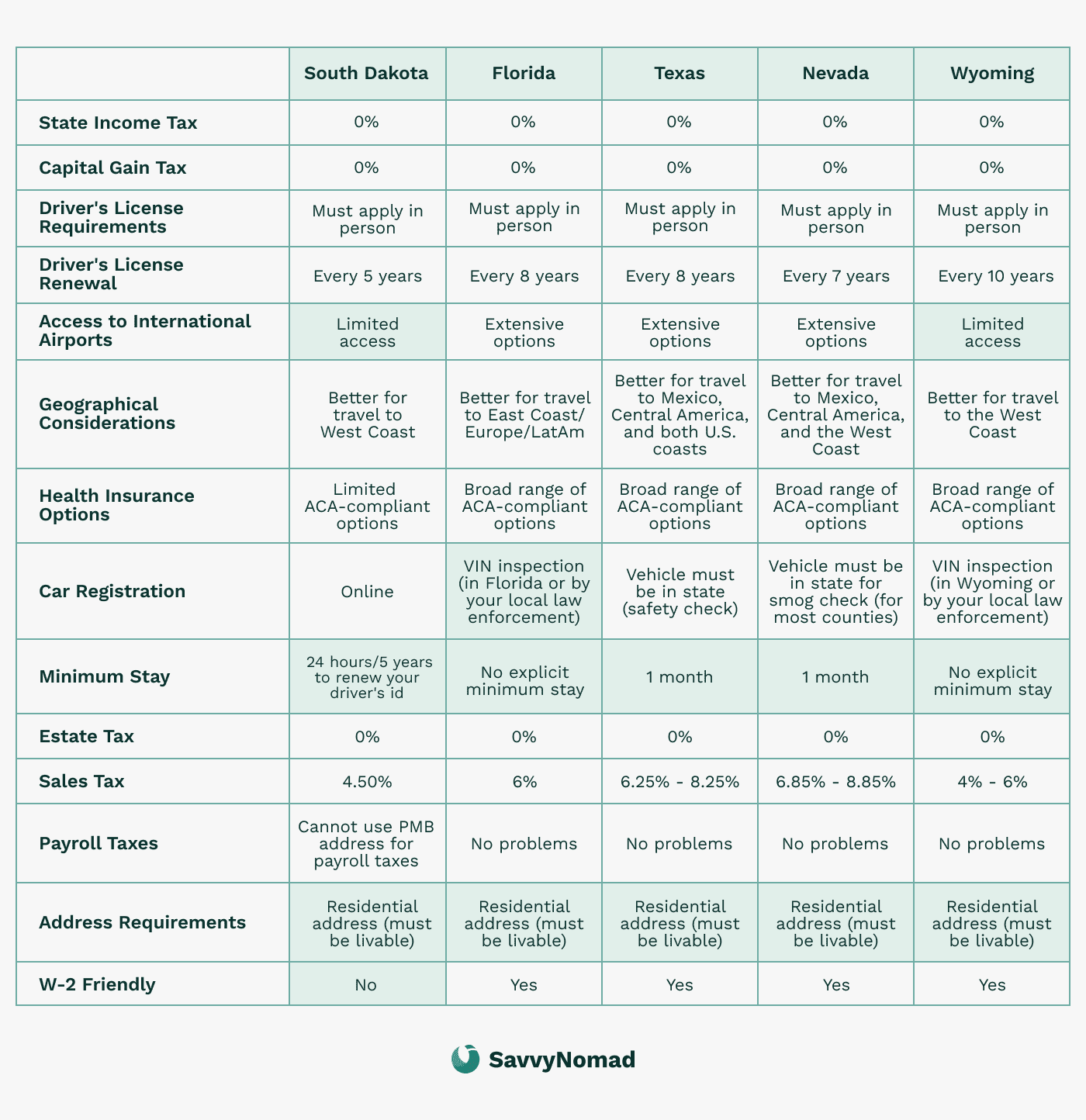How to leave Utah residency?

Leaving Utah residency involves more than just moving. Utah’s residency laws are crucial for determining your tax obligations, eligibility for state benefits, and educational opportunities. Whether you’re relocating for work, seeking lower taxes, or going back to school elsewhere, understanding the rules is important.
This guide will walk you through the key steps to sever ties with Utah, establish a new domicile, and manage any ongoing obligations like Utah-sourced income.
Step 1: Understanding Utah residency and domicile laws
Utah has specific rules to determine whether you’re a resident for tax purposes or not. These laws are important because they dictate whether you’re liable to pay Utah taxes on your worldwide income. Here’s how residency and domicile are determined:
1) Definitions of residency and domicile
- Residency: If you are domiciled in Utah, or you maintain a place of abode in Utah and spend 183 or more qualifying days in the state during a tax year, Utah generally classifies you as a resident for tax purposes.
- Domicile: Your domicile is your permanent home. You can only have one domicile at a time, even if you own homes in multiple states. This is where you plan to return to after any absences.
2) Tests for Utah domicile
- Test 1: You are domiciled in Utah if you or your spouse claims a child tax credit for a dependent attending a Utah public school or you’re enrolled as a resident student at a Utah university.
- Test 2: There’s a presumption of domicile if you or your spouse claims a residential property tax exemption, voted in Utah, or filed a Utah income tax return.
- Test 3: If you maintain significant ties to Utah, like listing a Utah address on tax forms or having a permanent home in the state, you might still be considered domiciled.
3) Non-domicile conditions
You are not domiciled in Utah if you’ve been absent for 761 consecutive days without returning for more than 30 days in a year and have no ties such as dependents in Utah schools or property claims.
Step 2: Establish a new domicile
Once you’ve made the decision to leave Utah, you need to establish your new domicile in another state. Simply moving isn’t enough—you’ll need to take specific steps to show that your new state is your permanent home.
Here’s what to do:
1) Establish new residency
- Secure a residential address: Find a place to live in your new state, whether it’s through renting or buying a home. Many states, like Florida, offer tax benefits such as the homestead exemption, which could help lower your property taxes. Setting up a permanent residence in your new state is essential to proving that you’ve left Utah.
This can be especially useful for digital nomads and expats who want a Florida documentation footprint in a tax friendly state, while recognizing that the address itself does not guarantee any particular tax outcome or acceptance by every agency or institution.
- File a Declaration of Domicile: Some states, like Florida, allow you to file a Declaration of Domicile, a legal document that confirms your intent to make the new state your permanent home.
Residency guides:

2) Relocate your belongings
Moving your personal belongings—like furniture, vehicles, and household items—helps show that your move is permanent, and that you intend to live in the new state long-term.
3) Spend time in your new state
The more time you spend in your new state, the stronger your case for establishing residency. Try to avoid spending too much time in Utah after the move so that your overall pattern of time clearly supports your new state as home rather than Utah.
4) Transfer IDs and vehicle registrations
Make sure to transfer your driver’s license and vehicle registration to your new state. This is a clear sign that your new state is now your permanent home.
5) Register to vote (if eligible)
Register to vote in your new state if you are eligible. Voter registration is a strong supporting indicator of residency, but it is considered together with many other facts and does not by itself determine your tax status. Do not forget to cancel your voter registration in Utah as well.
6) Update financial accounts
Notify your bank, credit card companies, and other financial institutions of your new address. Keeping all your financial documents up to date with your new residency helps keep your records consistent with your new domicile.
7) Notify your employer
Let your employer know about your new address so they can update your payroll and tax withholdings to your new state. This helps prevent Utah state income taxes from continuing to be withheld after your move, although your actual Utah tax liability will still depend on your own filings and Utah’s rules.

Step 3: Sever ties with Utah
Once you have established your new domicile, it is important to cut all significant ties with Utah. This helps reduce the risk that the state continues to consider you a resident for tax purposes or other legal obligations.
Here’s how to sever those ties:
1) Close Utah financial ties
- Close local bank accounts: If you have any Utah-based bank accounts or financial assets, consider closing or transferring them to banks in your new state. This shows that your financial life is now centered in your new state, not Utah.
- Update personal records: Update your address with the IRS, Social Security, and any other relevant entities. Keeping all personal and financial records in your new state helps solidify your move.
2) Sell or lease property
If you own property in Utah, selling or leasing it out on a long-term basis is a strong sign that you’ve left the state permanently. If leasing, a long-term lease agreement is preferable, as it helps demonstrate that you no longer consider Utah your primary residence.
3) Cancel local subscriptions/services
If you have memberships or subscriptions tied to Utah, such as gyms, clubs, or local services, canceling these will help reduce your ties to the state. Holding onto these services may suggest you still maintain a presence in Utah.
4) Transfer healthcare and insurance
Transferring your healthcare providers and insurance to your new state shows that your essential services are now tied to your new domicile.

Step 4: Time spent outside Utah
To avoid being taxed as a resident in Utah, it is important to manage the amount of time you spend in the state and to end Utah domicile. In addition to domicile tests, Utah uses a 183 day statutory residency test for people who maintain a place of abode in Utah.
183-day rule
- What is the 183 day rule?: If you maintain a place of abode in Utah and you are present in Utah for 183 or more qualifying days in a calendar year, Utah may treat you as a resident for tax purposes even if you claim domicile elsewhere. A qualifying day for this test is a day when you spend more time in Utah than in any other single state. This can make you liable for Utah income tax on your worldwide income.
- Stay well under the 183 day limit: To strengthen your nonresident position under the statutory residency test, you should aim to spend clearly fewer than 183 qualifying days in Utah each year and avoid maintaining a Utah place of abode after you move. Because a qualifying day is based on where you spend more time than anywhere else, it is still important to track even short visits carefully.
Keep detailed travel records
- Why it’s important: If your residency status is ever questioned, having detailed records of your time spent in and out of Utah will be essential for proving that you’ve stayed under the 183-day limit.
- What to track: Save flight tickets, hotel receipts, and any other travel documents that show when you entered and left Utah. Having a detailed log of your movements will be helpful if Utah’s Department of Revenue ever audits your residency status.
Step 5: Utah-sourced income
Even after you’ve officially left Utah residency, you may still have some income tied to the state, such as rental income or business revenue. It’s important to know how to handle Utah-sourced income to remain compliant with state tax laws.
Here’s how to handle Utah-sourced income once you’ve moved:
1) Ongoing tax responsibilities
- File non-resident tax returns: If you continue to earn income from sources within Utah, such as rental properties or businesses, you will need to file non resident tax returns. These returns are structured so that Utah taxes only the income you earned within the state, while income from outside Utah is handled under your new state and federal rules.
- Tax on Utah-sourced income: Even though you are no longer a resident, Utah still has the right to tax income generated within the state. This could include wages earned in Utah, rental income, or profits from Utah-based businesses.
2) Rental or business income
If you own rental property or a business in Utah, any income generated from those sources will still be subject to Utah state taxes. It is a good idea to consult with a tax professional to help you stay compliant with Utah tax laws, especially if you have complex income streams that tie back to the state.





